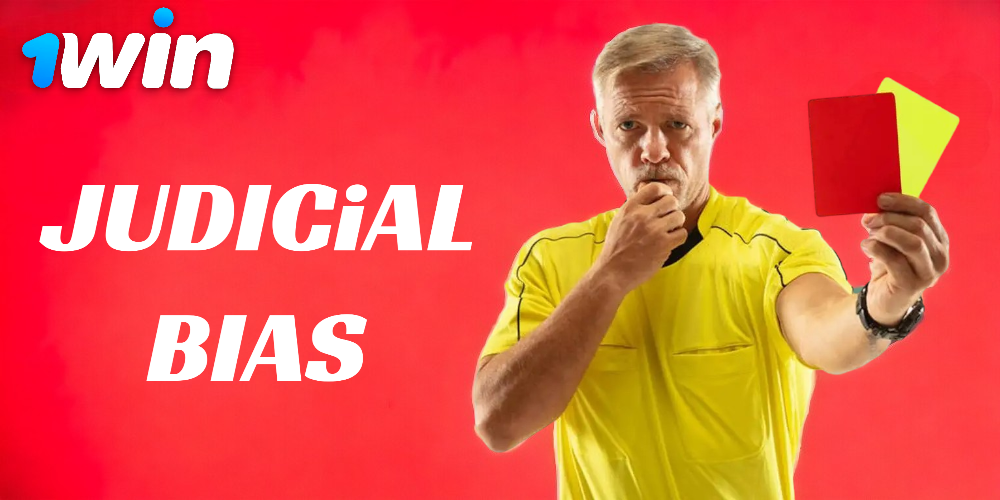Referee bias in sport has long been a subject of speculation and concern among fans, players and analysts. Impartiality is necessary to maintain the integrity of the game, but the human element creates the possibility of error, conscious or unconscious. This bias can manifest itself in various forms, from favouritism towards certain teams or players to influencing important decisions affecting the outcome of a match. In the context of sports betting, where millions of dollars are bet on the outcome of games, referee bias takes on a new dimension, potentially skewing betting outcomes and affecting the entire gambling industry. In this study, we delve into the complex relationship between referee bias and its impact on betting outcomes, with a particular focus on the 1Win (https://1winpro.ml/).
What Does Judicial Bias Mean
Referee bias can be caused by many factors, including personal preferences, subconscious influences, external pressures and even corruption. Research has shown that referees may show favouritism towards home teams, star players or teams with a large number of fans. It can manifest itself in a variety of ways, such as awarding more favourable decisions, condescending to offences committed by favoured teams, or interpreting ambiguous situations in such a way that one side benefits from the other. Although most referees endeavour to remain neutral, the inherent subjectivity of decision-making in sport leaves room for bias.
The consequences of referee bias on 1Win Mali betting results are significant: they can change the odds and affect the bets placed by punters. For example, if the referee consistently favours the home team, bookmakers may adjust betting lines to reflect this perceived advantage, leading to an increased volume of bets on the favoured team. Similarly, biased refereeing can directly affect the outcome of a match, leading to losses for those who have bet against unfair decisions. In the long term, inconsistencies can undermine the credibility of sports betting platforms and erode public confidence in the fairness of the system.
Moreover, referee bias can compromise the integrity of sporting events by calling into question the fairness of the results. In cases where referees show clear favouritism or make conflicting decisions, both spectators and betting players may question the legitimacy of the game, undermining trust in the sports industry as a whole. This change could have ripple effects for platforms such as 1Win Mali betting, as users may be wary of betting on events that are perceived to be tainted by referee bias.
Case Studies and Analyses

To illustrate the impact of referee bias on betting outcomes, it is useful to look at real life examples. One such case is the infamous ‘Hand of God’ incident during the 1986 World Cup, when Argentine legend Diego Maradona scored a goal with his hand, unnoticed by the referee. This blatant act of cheating not only changed the outcome of the match, but also had repercussions for betting markets as unsuspecting punters suffered losses due to the referee’s oversight.
Similarly, research in basketball has shown that referees exhibit implicit bias based on factors such as a player’s race and reputation. Research conducted by professors Justin Wolfers and Joseph Price has shown that NBA referees are more likely to record fouls against players of opposite races, a phenomenon known as racial bias. Such biases not only affect the outcome of individual games, but also have broader implications for sports betting markets, where odds are influenced by referees’ decisions.
Changes in the Problem of Judicial Bias
Addressing the problem of judicial bias requires a multifaceted approach that includes both proactive measures and systemic reforms. Training programmes aimed at raising judges’ awareness of unconscious bias can help mitigate the influence of subjective factors on their decisions. In addition, the introduction of technological solutions, such as video assistant referee (VAR) systems, can provide judges with improved tools to make accurate decisions, reducing the likelihood of human error or bias.
In addition, increased transparency and accountability in sport governing bodies is essential to build trust and integrity in the refereeing process. By implementing strict protocols for evaluating referees’ performance and imposing sanctions in cases of bias or misconduct, sports organisations can uphold the principles of fairness and impartiality that underpin sport competitions.
The implications of our findings go beyond sports betting, raising questions about the integrity of refereeing standards and the need for transparency in refereeing decisions. By shedding light on the impact of referee bias on betting outcomes, we hope to provoke a broader conversation about the role of regulation and oversight in ensuring the fairness of sporting events and the integrity of the betting industry, as 1Win sites are doing. Future research should explore strategies for avoiding referee bias, such as expanded training programmes, stricter oversight mechanisms and the implementation of technological refereeing tools.
In conclusion, our 1Win Mali review on the impact of referee bias on betting outcomes provides valuable insights into the complex interplay between sport, gambling and human psychology. By uncovering the dynamics of unfair refereeing, we have highlighted the challenges that both sports organisations and betting platforms, such as 1Win Mali, face in adhering to the principles of fair play and transparency. As the sports betting landscape continues to evolve, fixing the problem must remain a priority to ensure integrity and reliability.
